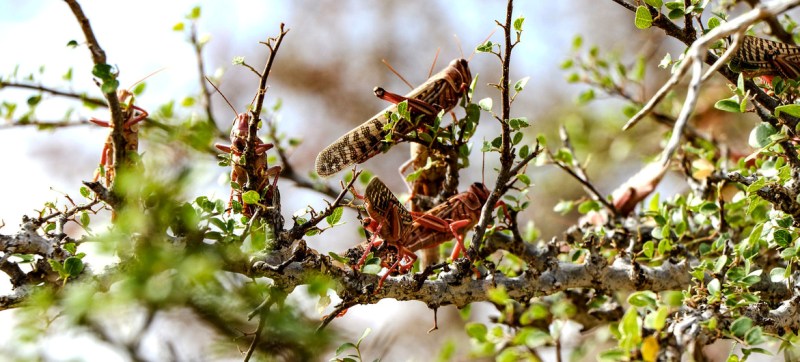 Locust
Locust Fears of Desert Locust resurgence in Horn of Africa
New York: The Desert Locust crisis which struck the greater Horn of Africa region earlier this year threatening food supplies for millions, could re-escalate as recent strong winds carried mature swarmlets from southern Somalia into eastern and northeastern Kenya, the UN Food and Agriculture Organization (FAO) said on Tuesday.
Although some of the swarmlets that reached Kenya may have already laid eggs before their arrival, there remains a risk of further egg-laying in sandy areas that saw recent rainfalls, according to FAO.
“In this case, hatching and hopper band formation can be expected in early December,” said the agency.
Breeding also continues in central Somalia and eastern Ethiopia where bands of hoppers – non-flying, nymphal stage locust – are present, and a new generation of immature swarms could start forming by the end of November.
Swarm formation is expected to continue throughout December due to widespread hatching and band formation that occurred mid-November. From the second week of December, several waves of numerous swarms can be expected to move south in Somalia and Ethiopia, reaching northern Kenya, FAO added.
A resurgence of the swarms could aggravate food security in the region, where almost 25 million people are already suffering from severe acute food insecurity. Desert Locusts are considered the most destructive migratory pest in the world, devouring large areas of crops and grasses meant for people and livestock.
Scaling up response
FAO is supporting authorities in Somalia to scale up anti-locust measures, focusing on areas at high risk.
“Survey and control operations, by ground and by air, have been scaled-up and are on-going,” said Etienne Peterschmitt, FAO Representative in Somalia.
“These resources include aircrafts, vehicles, equipment, biopesticides, insect growth regulators and staff that have been strategically been positioned in various parts of the country,” he added.
In addition to the measures to reduce breeding and swarms, FAO and partners are also supporting farmers in the affected areas. Supplies have been delivered and pre-positioned to assist food-insecure households that are at risk of locust invasion, including planting and replanting packages, supplementary feed and integrated cash assistance and livelihood support.
Regional situation
According to FAO, response efforts are also underway in Eritrea, Sudan and southeastern Egypt, as teams continue ground and aerial control operations against groups of hoppers and adults.
Across the Red Sea, strong southerly winds in mid-November caused immature swarms to move from the interior of Yemen to southwestern Saudi Arabia as well as in the interior north of Riyadh. Some of these swarms may continue further north towards Iraq in the next few days until the southerly winds subside, said FAO.
Support Our Journalism
We cannot do without you.. your contribution supports unbiased journalism
IBNS is not driven by any ism- not wokeism, not racism, not skewed secularism, not hyper right-wing or left liberal ideals, nor by any hardline religious beliefs or hyper nationalism. We want to serve you good old objective news, as they are. We do not judge or preach. We let people decide for themselves. We only try to present factual and well-sourced news.







